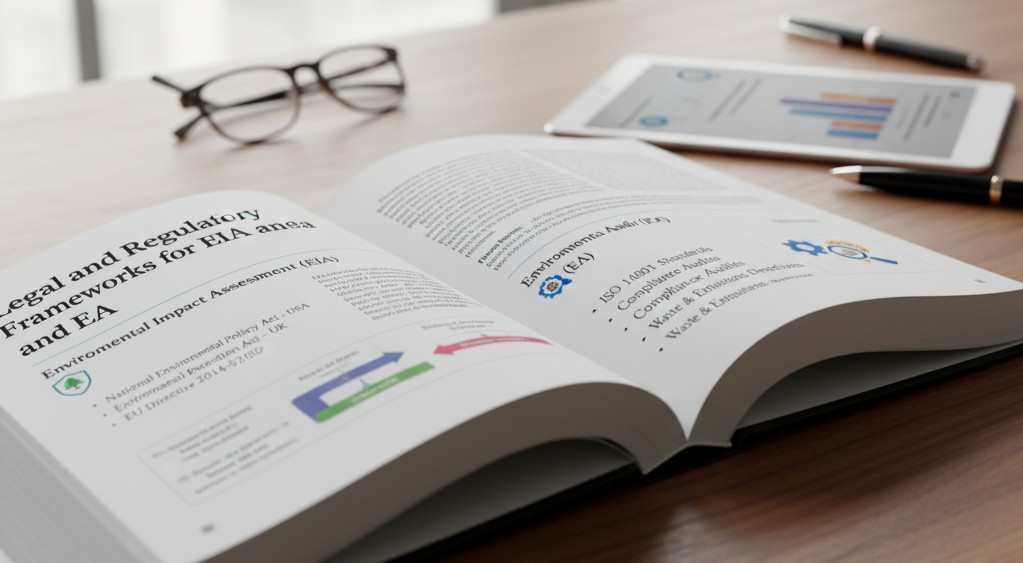
This advanced training course provides a deep dive into the legal and regulatory foundations that govern Environmental Impact Assessment (EIA) and Environmental Audit (EA). Participants will gain a comprehensive understanding of the international conventions, national laws, and institutional frameworks that mandate and shape these crucial environmental management tools. The training goes beyond the 'what' and 'how' of EIA and EA to explore the 'why'—the legal obligations and policy drivers that make them essential for both compliance and sustainable development.
The course curriculum is designed to equip participants with the knowledge to navigate complex legal landscapes. It covers a range of topics, including the fundamental principles of environmental law, the specific legislative requirements for EIA and EA in different jurisdictions, and the mechanisms for compliance and enforcement. The training also addresses emerging legal issues, such as the role of climate change legislation, and examines the critical intersection of legal frameworks with public participation and corporate due diligence.
Who should attend the training
Objectives of the training
Personal benefits
Organizational benefits
Training methodology
Trainer Experience
Our trainers are seasoned professionals with extensive experience in environmental law and policy. They have worked with governments, international organizations, and multinational corporations on a wide range of legal and regulatory matters. Their hands-on expertise ensures that the training is not only informative but also highly relevant and applicable to real-world scenarios.
Quality statement
We are dedicated to providing high-quality, impactful training that adheres to the highest professional standards. Our courses are continually reviewed and updated to incorporate the latest developments and best practices in the environmental field.
Tailor-made courses
We offer customized training solutions tailored to the specific needs of your organization. We can design a program with a focus on a particular industry, a specific country's regulations, or a combination of topics to meet your unique requirements.
Course Duration: 5 days
Training fee: USD 1300
Module 1: Introduction to Environmental Law and Governance
Module 2: International Conventions and Agreements
Module 3: National Legal Frameworks for EIA
Module 4: National Legal Frameworks for EA
Module 5: Regulatory Compliance and Enforcement
Module 6: Public Participation and Access to Justice
Module 7: Due Diligence and Lender Requirements
Module 8: Case Law and Legal Precedents
Module 9: Evolving Legal Issues and Trends
Module 10: Future of Environmental Law and Harmonization
Requirements:
· Participants should be reasonably proficient in English.
· Applicants must live up to Armstrong Global Institute admission criteria.
Terms and Conditions
1. Discounts: Organizations sponsoring Four Participants will have the 5th attend Free
2. What is catered for by the Course Fees: Fees cater for all requirements for the training – Learning materials, Lunches, Teas, Snacks and Certification. All participants will additionally cater for their travel and accommodation expenses, visa application, insurance, and other personal expenses.
3. Certificate Awarded: Participants are awarded Certificates of Participation at the end of the training.
4. The program content shown here is for guidance purposes only. Our continuous course improvement process may lead to changes in topics and course structure.
5. Approval of Course: Our Programs are NITA Approved. Participating organizations can therefore claim reimbursement on fees paid in accordance with NITA Rules.
Booking for Training
Simply send an email to the Training Officer on training@armstrongglobalinstitute.com and we will send you a registration form. We advise you to book early to avoid missing a seat to this training.
Or call us on +254720272325 / +254725012095 / +254724452588
Payment Options
We provide 3 payment options, choose one for your convenience, and kindly make payments at least 5 days before the Training start date to reserve your seat:
1. Groups of 5 People and Above – Cheque Payments to: Armstrong Global Training & Development Center Limited should be paid in advance, 5 days to the training.
2. Invoice: We can send a bill directly to you or your company.
3. Deposit directly into Bank Account (Account details provided upon request)
Cancellation Policy
1. Payment for all courses includes a registration fee, which is non-refundable, and equals 15% of the total sum of the course fee.
2. Participants may cancel attendance 14 days or more prior to the training commencement date.
3. No refunds will be made 14 days or less before the training commencement date. However, participants who are unable to attend may opt to attend a similar training course at a later date or send a substitute participant provided the participation criteria have been met.
Tailor Made Courses
This training course can also be customized for your institution upon request for a minimum of 5 participants. You can have it conducted at our Training Centre or at a convenient location. For further inquiries, please contact us on Tel: +254720272325 / +254725012095 / +254724452588 or Email training@armstrongglobalinstitute.com
Accommodation and Airport Transfer
Accommodation and Airport Transfer is arranged upon request and at extra cost. For reservations contact the Training Officer on Email: training@armstrongglobalinstitute.com or on Tel: +254720272325 / +254725012095 / +254724452588
| Course Dates | Venue | Fees | Enroll |
|---|---|---|---|
| Feb 16 - Feb 20 2026 | Vancouver | $7,000 |
|
| Jan 26 - Jan 30 2026 | Madrid | $4,500 |
|

Armstrong Global Institute
Typically replies in minutes